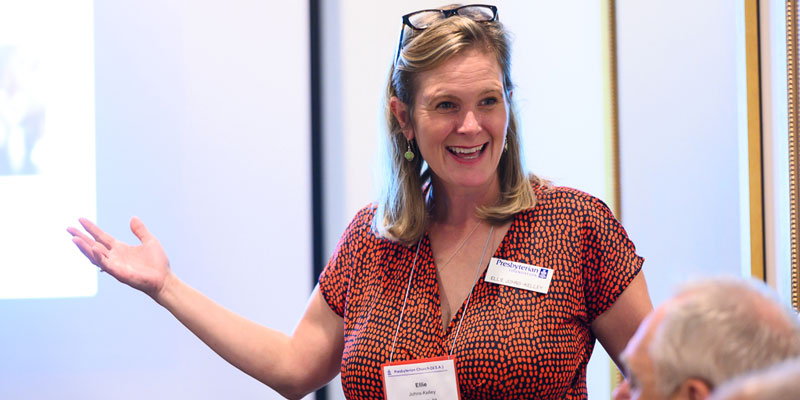BALTIMORE — Death is not something most people want to discuss. We avoid the topic, and we certainly don’t want to bring it up in a discussion.
But by avoiding this topic, pastors and churches are veering away from an important theological discussion that can provide peace and relief to members of the congregation. Not only that, churches may be losing opportunities to further the mission and ministry of the church.
This was the topic of a seminar offered by the Presbyterian Foundation at Big Tent, the biennial conference held by the Presbyterian Church (U.S.A.). The gathering was held Aug. 1-3 in Baltimore. Rev. Ellie Johns-Kelley, Ministry Relations Officer, and Olanda Carr, Senior Ministry Relations Officer, both from the Presbyterian Foundation, presented a seminar on the topic of planned giving at the event.
“If we are resurrection people and we can’t take our stuff with us, and we know U-Hauls can’t follow hearses, what’s going on?” asks Johns-Kelley. “Churches aren’t talking about it.”
Assembling a team
Pulling together the right volunteers is the place to start. “Who are the good storytellers?” Carr says. “Who are the folks who have committed to the church for the long haul? It’s helpful to know giving patterns. The person who gives steadily over 20 to 30 years, they’re likely to leave a legacy gift.”
The people who are likely to want to give a legacy gift could be helpful on your planned giving team as they assist with creating a program. “Sit down with those folks who are regular contributors who love the church and ask for their ideas on the best ways to launch the legacy program,” Johns-Kelley says.
Also invite members of your church’s stewardship and generosity team to join you. They will need to know about your team’s plans so they can adjust or plan stewardship programs. Carr says he’s often asked about the timing of launching a planned giving program. He usually advises congregations to wait until after pledge Sunday is complete to launch planned giving, so the two programs aren’t competing for time and attention.
One of the most important tasks for this team is to create a planned giving and bequests policy. “If your church received a $1 million bequest, would your session agree with how to use that?” Carr asks.
The Foundation has samples of bequest policies from other congregations. Contact the Ministry Relations Officer for your region to request samples of these policies.
Planning events
Creating a planned giving program allows church members to self-select if they’d like to participate, and it makes the discussion easier. Foundation Ministry Relations Officers can come to a congregation and lead the program, if desired, Carr notes.
Programs can be offered during a lunch following worship. Rev. Anne Marie Meyerhoffer, Interim Pastor at Marcellus First Presbyterian Church in New York, says her church’s planned giving program launched with a lunch following worship called “A Lunch to Die For.” Using a clever title helped infuse some fun into a difficult conversation.
Beyond discussion of creating a will, such a program can be a more comprehensive look at end of life decisions and planning. Ask participants if they have a named executor for their estate, and to consider creating some instructions for a funeral service, including which hymns they’d like and where they might like to be buried.
Why start a legacy program?
Creating a legacy program gives structure to the gifts that members of your congregation might like to make through their wills, trusts or estates. It helps prompt thoughtful planning, and helps members make good decisions.
Johns-Kelley notes that in some cases, a church’s legacy program can help churches avoid receiving bequests that are difficult to liquidate. She worked with a congregation that received a teddy bear collection that turned out to be worth $16,000.
At another church, a member bequeathed a much-loved doll collection to the church, Carr says. “A doll collection sitting in a room in the church does nothing for the mission and ministry of a congregation,” Carr says. “But if it can be sold, the funds can be put to good use.”
The Foundation can help congregations find appraisers and place a value on items so they can be sold.
A planned giving or legacy program can include funds to support various aspects of church life, including music ministry funds to pay musicians, or a building fund for the upkeep of the facility. Funds could be set up for a particular mission or ministry as well. “By no means are you asking people to leave everything to your church and nothing to their family,” Carr says. “You’re just asking them to consider the church when creating an estate plan. Chances are, they will, but you have to ask.”
Robyn Davis Sekula is Vice President of Communication and Marketing for the Presbyterian Foundation. You can reach her at (502) 569-5101 or robyn.sekula@presbyterianfoundation.org.

